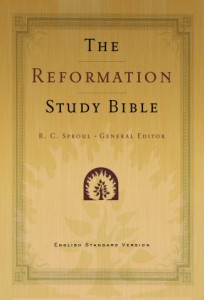 Sidenote: The REFORMATION STUDY BIBLE in the ESV is available on sale in bonded and genuine leather (in burgundy and black) “how many of you have read it?”
Sidenote: The REFORMATION STUDY BIBLE in the ESV is available on sale in bonded and genuine leather (in burgundy and black) “how many of you have read it?”
Many raised their hands until he quickly added, “all of it?”
I could hear audible grumblings around me as many of those with raised hands now slowly lowered them. Some mumbled, “I’ve read most of it”, or “I’ve read all of the New Testament.” One thing became clear, only about 5% of the audience had actually read the Bible through.
He then asked, “how many of you have read any other book?”
All raised their hands once again.
Then the preacher said, “do you see how inconsistent this is? Here you are, having read other books, but the book you claim to believe is inspired by God Himself, is not something you have read. What does this say about your belief in the Bible?”
The silence that ensued was more than a little uncomfortable.
He went on, “If you sincerely believe the Bible is the word of God, should you not have read it?”
Once again, he paused, allowing for the question to make its intended impact.
Finally, he then said, “Here’s my challenge – start today and read three chapters a day and four on Sundays and by this time next year you will have read the Bible through.”
 I am sure there are better methods for reading through the Bible but the preacher’s point is a good one. We as Christians need to be “people of the book.” If there is one book we should read or should have read, it is the Bible. All Scripture is breathed out by God (2 Tim. 3:16) and it is unlike any other book out there. Job wrote that he loved God’s law more than his necessary food (23:12). He would rather go without food than miss time with the word of God. Can the same be said about us?
I am sure there are better methods for reading through the Bible but the preacher’s point is a good one. We as Christians need to be “people of the book.” If there is one book we should read or should have read, it is the Bible. All Scripture is breathed out by God (2 Tim. 3:16) and it is unlike any other book out there. Job wrote that he loved God’s law more than his necessary food (23:12). He would rather go without food than miss time with the word of God. Can the same be said about us?
Justin Taylor wrote the following: “I really believe in the value of not just reading, but hearing, God’s Word… In listening to an old lecture recently by J. I. Packer, he made the comment that it was not until after the 17th century (as far as he could tell) that people started doing silent prayers and reading as opposed to praying and reading out loud. For most evangelicals, silence represents the vast majority of our reading and praying. But I wonder if that’s to our detriment. One of the great enemies to Bible reading and praying is a wandering mind—and one of the great ways to make your mind wander is to do everything in your mind without involving your voice and ears! . . . Here’s something else to consider: the entire Bible on audio is usually about 75 hours (or 4500 minutes). If you commute to work 5 days a week, that’s about 260 days a year. And if it takes you, say, 17 minutes to commute each way to work—and if you listen to the Bible on audio during your drive each way—you’ll get through the entire Bible twice in a year.”
There are many good daily Bible reading plans. For those who would like the convenience of an online source there are now many options. New technology allows not only the reading of the Bible, but hearing it too. If you enjoy the ESV here are many different plans to choose from – each of which allow for each daily segment to be sent to your e-mail address or as a podcast.
 26 For if we go on sinning deliberately after receiving the knowledge of the truth, there no longer remains a sacrifice for sins, 27 but a fearful expectation of judgment, and a fury of fire that will consume the adversaries. 28 Anyone who has set aside the law of Moses dies without mercy on the evidence of two or three witnesses. 29 How much worse punishment, do you think, will be deserved by the one who has trampled underfoot the Son of God, and has profaned the blood of the covenant by which he was sanctified, and has outraged the Spirit of grace? 30 For we know him who said, “Vengeance is mine; I will repay.” And again, “The Lord will judge his people.” 31 It is a fearful thing to fall into the hands of the living God. – Hebrews 10:26-31 (ESV)
26 For if we go on sinning deliberately after receiving the knowledge of the truth, there no longer remains a sacrifice for sins, 27 but a fearful expectation of judgment, and a fury of fire that will consume the adversaries. 28 Anyone who has set aside the law of Moses dies without mercy on the evidence of two or three witnesses. 29 How much worse punishment, do you think, will be deserved by the one who has trampled underfoot the Son of God, and has profaned the blood of the covenant by which he was sanctified, and has outraged the Spirit of grace? 30 For we know him who said, “Vengeance is mine; I will repay.” And again, “The Lord will judge his people.” 31 It is a fearful thing to fall into the hands of the living God. – Hebrews 10:26-31 (ESV)
 Sidenote: The REFORMATION STUDY BIBLE in the ESV is available on sale in bonded and genuine leather (in burgundy and black) “how many of you have read it?”
Sidenote: The REFORMATION STUDY BIBLE in the ESV is available on sale in bonded and genuine leather (in burgundy and black) “how many of you have read it?” I am sure there are better methods for reading through the Bible but the preacher’s point is a good one. We as Christians need to be “people of the book.” If there is one book we should read or should have read, it is the Bible. All Scripture is breathed out by God (2 Tim. 3:16) and it is unlike any other book out there. Job wrote that he loved God’s law more than his necessary food (23:12). He would rather go without food than miss time with the word of God. Can the same be said about us?
I am sure there are better methods for reading through the Bible but the preacher’s point is a good one. We as Christians need to be “people of the book.” If there is one book we should read or should have read, it is the Bible. All Scripture is breathed out by God (2 Tim. 3:16) and it is unlike any other book out there. Job wrote that he loved God’s law more than his necessary food (23:12). He would rather go without food than miss time with the word of God. Can the same be said about us? by Don Kistler
by Don Kistler